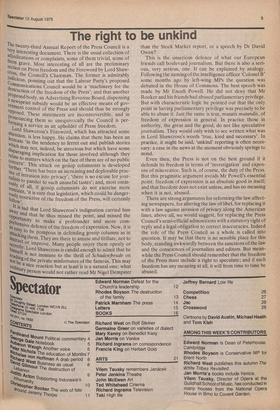The right to be unkind
The twenty-third Annual Report of the Press Council is a verY interesting document. There is the usual collection of adjudications or complaints, some of them trivial, some of them grave. Most interesting of all are the preliminary section on Press freedom and the Foreword by Lord Shawcross, the Council's Chairman. The former is admirably Judicious, pointing out that the Labour Party's proposed Sommunications Council would be a 'machinery for the uestruction of the freedom of the Press'; and that another Pr°Posqd body, an Advertising Revenue Board, dispensing a newsprint subsidy would be an effective means of government control of the Press and should thus be strongly °PPosed. These statements are incontrovertible, and in rnouncing them so unequivocally the Council is per Rung a service as an upholder of Press freedom. Lord Shawcross's Foreword, which has attracted some I a. ttent:_n, au is less happy. He claims that there has been an %I/ncrease 'in the tendency to ferret out and publish stories d'hich In" r 1Shr ag r ing implication for those involved although they not, indeed, be atrocious but which have some elatae to matters which on the face of them are of no public efo°neerte. This attack on goisip columnists is developed ti rther. 'There has been an increasing and deplorable prac..°_,e. of intrusion into privacy'; 'there is no excuse for jourzsts to pander to such unuseful tastes'; and, most ominte slY of all, 0 sstraint, 'it is sure that legislation, which could be dangerlf gossip columnists do not exercise more f 11„ I Y restrictive of the freedom of the Press, will certainly .onow, It a„, i s sad that Lord Shawcross's indignation carried him 0:aY and that he thus missed the point, and missed the prPoP,ortuni ty to make i profounder and more comas :enasYsive defence of the freedom of expression. Now, it is to be atta pompous in defending gossip columns as in insfeitIng them. They are there to amuse and titillate, not to s4uct improve. Many people enjoy them openly or or himetly: Lord Shawcross is candid enough to admit that he reads.elf is not immune to the thrill of Schadenfreude on not b8of the private misfortunes of the famous. This may ord.ue a nice reaction but at least it is a natural one: what unlary person would not rather read Mr Nigel Dempster than the Stock Market report, or a speech by Dr David Owen?
This is the unserious defence of what our European friends call boulevard journalism. But there is also a serious, very serious, one. It can be explained by analogy. Following the naming of the intelligence officer 'Colonel B' some months ago by left-wing MPs the question was debated in the House of Commons. The best speech was made by Mr Enoch Powell. He did not deny that Mr Rooker and his friends had abused parliamentary privilege. But with characteristic logic he pointed out that the only point in having parliamentary privilege was precisely to be able to abuse it. Just the same is true, mutatis mutandis, of freedom of expression in general. In practice those in authority, the great and the good, do not like speculative journalism. They would only wish to see written what was in Lord Shawcross's words 'true, kind and necessary'. In practice, it might be said, 'unkind' reporting is often necessary: a case in the news at the moment obviously springs to mind.
Even then, the Press is not on the best ground if it defends its freedom in terms of 'investigation' and exposure of miscreance. Such is, of course, the duty of the Press. But this pragmatic argument avoids Mr Powell's essential point: freedom of expression is an absolute good in itself; and that freedont does not exist unless, and has no meaning when it is not, abused.
There are strong arguments for reforming the law affecting newspapers, for altering the law of libel, for replacing it with a law against invasion of privacy along the American lines, above all, we would suggest, for replacing the Press Council's semi-official admonitions with a statutory right of reply and a legal obligation to correct inaccuracies. Indeed the role of the Press Council as a whole is called into question. It may be that there is no sensible place for this body, standing awkwardly between the sanctions of the law and the consciences of journalists and editors. But meanwhile the Press Council should remember that the freedom of the Press must include a right to speculate; and if such freedom has any meaning at all, it will from time to time be abused.






























 Previous page
Previous page